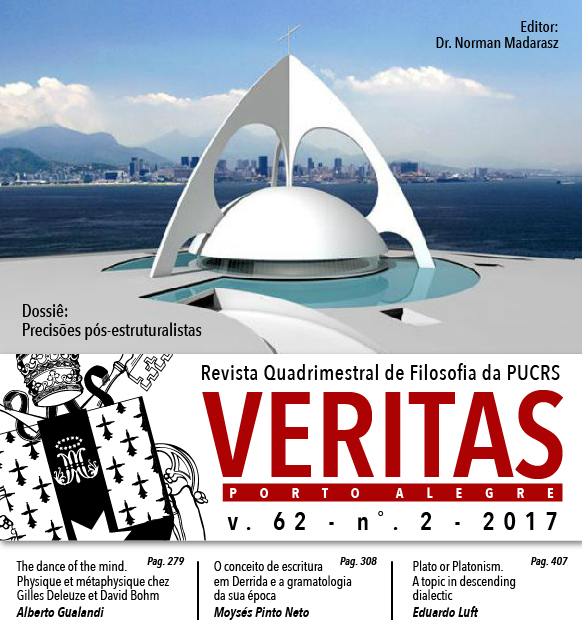Deconstructing the substantialist conception of God: recasting Heidegger's critique of Augustine
DOI:
https://doi.org/10.15448/1984-6746.2017.2.28216Palabras clave:
being, essence, God, metaphysics, ontology, substance.Resumen
In this paper, I argue that Augustine's conception of God as substance (substantia) has misleadingly been evoked by Martin Heidegger's deconstruction of onto-theological and substantialist variants of metaphysics as they mistook entities (Seienden, entia, beings) for their very Being (Sein, ens, esse) which cannot be conceptualized or objectified by human thinking, but makes both their thought and reality possible. Even though Augustine sought somehow to reconcile a Neoplatonic, essentialist cosmology with a Judeo-Christian worldview of historical redemption, Heidegger not only failed to properly recognize his indebtedness to Augustinian existential anthropology, but also the latter's contention that the actuality of beings and contingent history ultimately determines ontological concepts in their basic difference from their ontical counterparts, compromising thus Heidegger's intuitive criticisms against the confusion between God and Being (Sein).
Descargas
Citas
Agamben, Giorgio. The kingdom and the glory: For a theological genealogy of economy and government. Trans. Lorenzo Chiesa and Matteo Mandarini. Stanford University Press, 2011.
Arendt, Hannah. Love and Saint Augustine. Edited and with an interpretive essay by Joanna Vecchiarelli Scott and Judith Chelius Stark. University of Chicago Press, 1996. [Der Liebesbegriff bei Augustin, 1929]
Augustinus, Aurelius. Corpus Christianorum: Series Latina, vols. 27 59. Turnhout: Brepols, 1953.
_______. Patrologia Latina. Paris: Migne, 1841-42.
_______. Confessions, 2 vols. Tradução de William Watts. The Loeb Classical Library. Londres: Heinemann, 1968.
_______. Augustine of Hippo: Selected Writings. Trans. Mary T. Clark. Nova York, Ramsey & Toronto: Paulist Press, 1984.
_______. The Essential Augustine. Edited by Vernon J. Bourke. Indianapolis: Hackett, 1974.
_______. On Free Choice of the Will. Trans. Anna Benjamin and L.H. Hackstaff. Nova York: Macmillan, 1964.
Barr, James. The Semantics of Biblical Language. Oxford University Press, 1961.
Brown, Peter. Augustine of Hippo: A Biography. Berkeley / Los Angeles: University of California Press, 1967. Revised Edition, 2000.
Caputo, John D. and Michael J. Scanlon, editors. Augustine and postmodernism: Confessions and circumfession. Bloomington, IN: Indiana University Press, 2005.
_______. The Mystical Element in Heidegger's Thought. Athens: Ohio University Press, 1978. Revised, paperback edition with a new "Introduction:" New York: Fordham University Press, 1986.
_______. Heidegger and Aquinas. Fordham University Press, 1982.
Coyne, Ryan. Heidegger's Confessions: The remains of Saint Augustine in Being and Time and beyond. The University of Chicago Press, 2015. DOI: https://doi.org/10.7208/chicago/9780226209449.001.0001
Derrida, Jacques. "Circumfession," in Geoffrey Bennington and Jacques Derrida, Jacques Derrida, trans. Geoffrey Bennington. Chicago/London: University of Chicago Press, 1993. [1991]
Fredriksen, Paula. Augustine and the Jews. A Christian defense of Jews and Judaism. New Haven, Conn.: Yale University Press, 2010.
Gilson, Etienne. Introduction à l'étude de saint Augustin. 2e éd. Paris: Vrin, 1943.
_______. "Propos sur l'être et sa notion," San Tommaso e il pensiero modemo, ed. Antonio Piolanti. Citta Nuova: Pontificia Academia Romana deS. Tommaso d' Aquino, l974.
Heidegger, Martin. Being and Time. Translated by John Macquarrie and Edward Robinson. New York: Harper & Row, 1962.
_______. The Basic Problems of Phenomenology. Bloomington: Indiana University Press, 1982.
_______. Sein und Zeit. Tübingen: Niemeyer, 1986. (16th edition)
_______. Phenomenology of the Religious Life. Translated by Matthias Fritsch and Jennifer Anna Gosetti-Ferencei. Bloomington: Indiana University Press, 2004.
_______. Gesamtausgabe. Frankfurt am Main: Vittorio Klostermann, 1976 - .
Horrigan, Paul Gerard. God's Existence and Other Philosophical Essays. Lincoln, NE: iUniverse, 2007.
Jonas, Hans. Augustin und das paulinische Freiheitsproblem. Eine philosophische Studie zum pelagianischen Streit. 2nd edition. Göttingen: Vandenhoeck & Ruprecht, 1965. [1930] DOI: https://doi.org/10.13109/9783666531163
Kuehn, Evan F. "The Johannine Logic of Augustine's Trinity: A Dogmatic Sketch." Theological Studies 68 (2007): 572-594. DOI: https://doi.org/10.1177/004056390706800305
Levinas, Emmanuel. En découvrant l’existence avec Husserl et Heidegger. Paris: Vrin, 1967.
Levy, Ze'ev. Baruch Spinoza: Seine Aufnahme durch die jüdischen Denker in Deutschland, Stuttgart 2001.
_______. Spinoza and the Concept of Judaism: A concept and its influence on Jewish Thought. Tel Aviv, 1972 (Hebrew), 2nd ed. 1983, 3rd ed. 1991.
Marion, Jean-Luc. Dieu sans l’être, Paris: Fayard, 1982.
Marrou, Henri-Irinée. La théologie de l'histoire: Augustinus Magister. Paris: Cerf, 1968.
_______. St. Augustin et l'augustinisme. Paris: Seuil, 1955.
O'Leary, Joseph Stephen. Questioning Back: The Overcoming of Metaphysics in Christian Tradition. Chicago: Winston Press, 1985.
Pépin, Jean. Mythe et allégorie. Paris: Éditions Montaigne, 1958.
_______. Saint Augustin et la dialectique. Villanova University Press, 1976.
Ricoeur, Paul. Temps et récit, 3 vols. Paris: Editions du Seuil, 1983-85.
Stump, Eleonore and Norman Kretzmann, eds. The Cambridge Companion to Augustine. Cambridge University Press, 2001. DOI: https://doi.org/10.1017/CCOL0521650186
von Herrmann, Friedrich-Wilhelm. Augustine and the Phenomenological Question of Time [Augustinus und die Phänomeologische Frage Nach der Zeit]. Lewiston: Edwin Mellen Press 2008.
Zarader, Marlène. La Dette impensée: Heidegger et l'héritage hébraïque. Paris: Seuil, 1990.
Descargas
Publicado
Cómo citar
Número
Sección
Licencia
Derechos de Autor
La sumisión de originales para la Revista Veritas implica la transferencia, por los autores, de los derechos de publicación. El copyright de los artículos de esta revista es el autor, junto con los derechos de la revista a la primera publicación. Los autores sólo podrán utilizar los mismos resultados en otras publicaciones indicando claramente a Revista Veritas como el medio de la publicación original.
Creative Commons License
Excepto donde especificado de modo diferente, se aplican a la materia publicada en este periódico los términos de una licencia Creative Commons Atribución 4.0 Internacional, que permite el uso irrestricto, la distribución y la reproducción en cualquier medio siempre y cuando la publicación original sea correctamente citada. Copyright: © 2006-2020 EDIPUCRS






